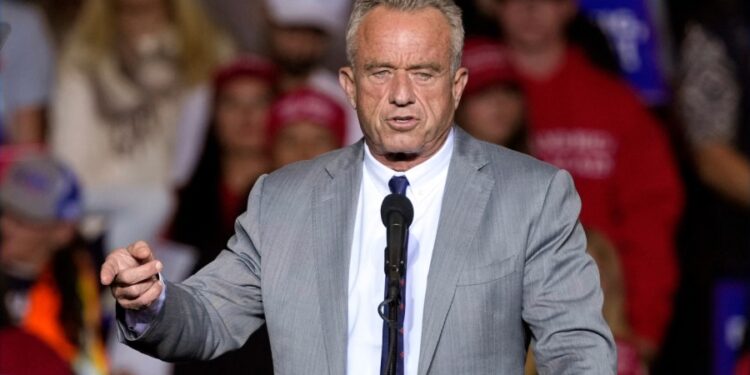
Whether or not the U.S. Senate confirms Robert F. Kennedy Jr. as the secretary of Health and Human Services, his nomination and that of others suggests the federal government’s role in health policy might change dramatically in the second Trump administration. Members of Congress — and many others — are now asking an important question: What impact might changes at Health and Human Services have on the health of the nation?
Between us, we have worked in federal, state and local health agencies. The answer to this question is more complicated than it may seem. Unlike in some countries, the U.S. does not have a single, coherent public health system. In fact, under the Constitution, the core responsibility for health resides with states, not with the federal government. As the nation saw during COVID-19, the federal government does not control local decision-making on many crucial public health questions.
Yet the relative independence of state and local public health officials cannot make up for missteps at the federal level. The department and its core agencies play four essential roles that are difficult (or impossible) for others to take over.
First, Health and Human Services is a regulator. Only the U.S. Food and Drug Administration, an agency within the Department of Health and Human Services, approves drugs, medical devices, vaccines and other such products. This means if the federal government does not authorize a vaccine for pandemic H5N1 influenza, it will be unavailable anywhere in the country, even in the event of an outbreak. If an administration undermines the review process of medical products, there is no state or local process that can take its place.
There are also less appreciated regulatory roles within the department. For example, the Office of the National Coordinator sets standards for access to medical records and the Office for Civil Rights oversees privacy protections for health data. Through its advisory committee, the Centers for Disease Control and Prevention sets the standard for which vaccines will be made available to American children through the Vaccines for Children program and to all Americans without charge under the Affordable Care Act.
There are limits to how substantially political appointees can influence regulation. Agencies must follow laws that set out what criteria must be considered, how evidence must be used, how appropriated funds are spent and, in some cases, who is specifically responsible in making regulatory decisions. Yet many of these laws leave considerable discretion to agency or department leadership. Even a small change in regulatory policy could affect the health of thousands or even millions of Americans.
Second, Health and Human Services is a payer for health care services. The budget of the Center for Medicare and Medicaid Services, another agency at Health and Human Services, exceeds $1.5 trillion, and the agency sets key standards for hospitals, nursing homes and other providers of health care services. Changes to these programs have enormous implications for the delivery of health care to the more than 150 million Americans who rely on these programs for coverage and quality standards.
Third, Health and Human Services is a funder. For example, the budget of the National Institutes of Health exceeds $48 billion each year, most of which flows to universities around the country for research into diseases and treatments. Other federal agencies distribute billions more around the country. While Congress sets the amount and priorities, officials at Health and Human Services have considerable say over where money goes and how it is used. States and localities generally do not have the funds to make up shortfalls in biomedical research or core public health programs like vaccination.
Fourth, and finally, Health and Human Services is a communicator. The U.S. Surgeon General provides high-profile guidance to Americans on how to protect their health, such as stopping smoking, using naloxone and obtaining recommended vaccinations. The Centers for Disease Control and Prevention provide guidance on evolving outbreaks, while FDA works to provide doctors and patients with new information about the safety and effectiveness of medical products, including vaccines.
Certainly, Health and Human Services is far from the only source of information on public health topics. State and local public health leaders, academic experts and thousands of clinicians and community leaders are trusted messengers about health topics. But messaging works best when it is clear and consistent. If a senior federal official says something different than a local official, as happened often during COVID-19, confusion can result. On vaccines, falsehoods from agency leaders can confuse parents about whether to vaccinate their children, leaving them and their communities vulnerable to outbreaks of deadly illness.
One of us worked for the late Sen. Edward Kennedy (D-Mass.), RFK’s uncle and a champion of health care for decades in the Senate. Even when critical of agencies like the National Institutes of Health and FDA, he always deeply respected the scientific expertise of these agencies and their critical roles in protecting and advancing the health of Americans. Health and Human Services is far from a perfect department, and a new administration will have many opportunities for productive reform. Federal leadership that embraces new solutions based on evidence could accelerate progress on reducing cardiovascular disease and overdoses and lengthen U.S. life expectancy.
In choosing a secretary, the president can set in motion initiatives to advance the health of the nation — or can set such efforts back across the country. Rather than assume that one person cannot have too much of an impact, the Senate should closely scrutinize the track record of Robert F. Kennedy Jr. and other nominees, as if the health of Americans depended upon it.
David Blumenthal served as the national coordinator for health information technology at HHS from 2009 to 2011 and previously served as staff to Sen. Edward Kennedy (D-Mass.).
Josh Sharfstein served as former principal deputy commissioner of the U.S. Food and Drug Administration from 2009 to 2011.





